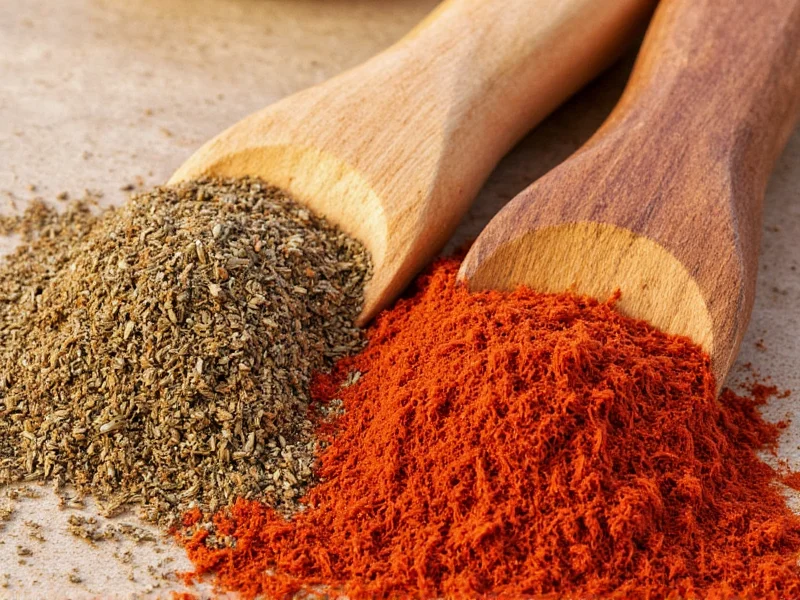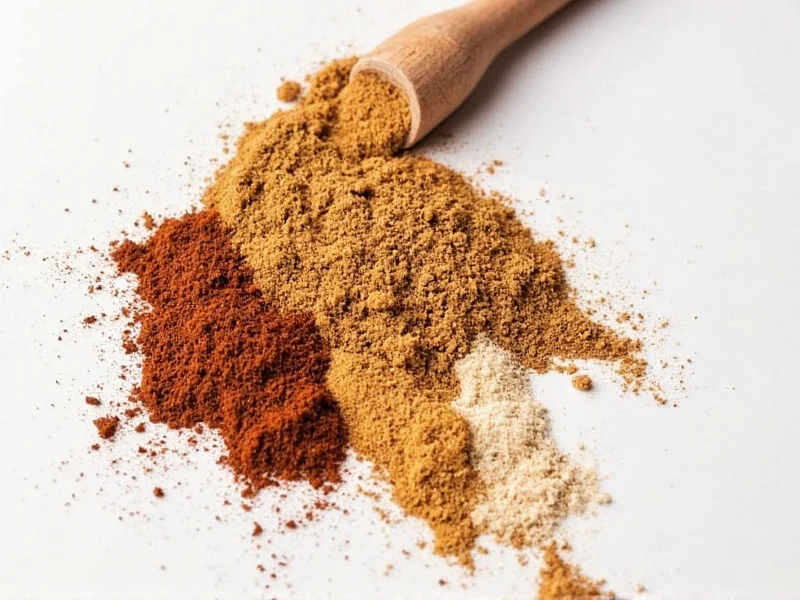Why Gluten in Spices Matters More Than You Think
For 3 million Americans with celiac disease, even trace gluten triggers intestinal damage. A 2021 NIH-funded study found 67% of accidental gluten exposures occur through pantry staples like spices. This isn't about taste—it's about preventing chronic inflammation, nutrient malabsorption, and long-term health risks. If you've experienced unexplained digestive issues after "gluten-free" meals, your spice rack might be the hidden culprit.
The Science-Backed Truth: Pure Spices vs. Processing Risks
Natural spices contain zero gluten—their molecular structure differs fundamentally from wheat proteins. The Gourmend Foods research team confirms: "Pure single-ingredient spices are inherently gluten-free." But industrial processing creates three contamination pathways:
| Risk Level | Spice Examples | Primary Contamination Source | Safety Threshold |
|---|---|---|---|
| Low Risk | Whole peppercorns, dried basil, pure turmeric | None (when certified) | GFCO: ≤10ppm |
| Moderate Risk | Ground cumin, paprika, garlic powder | Shared harvesting equipment | 10-20ppm (FDA limit) |
| High Risk | Curry blends, taco seasoning, onion salt | Additives (wheat starch) or shared packaging lines | Often >20ppm |
This aligns with the PMC study showing 23% of tested spice samples exceeded safe limits due to shared facilities with wheat crops. Crucially, the FDA allows "gluten-free" labels for products under 20ppm gluten, but the Gluten-Free Certification Organization (GFCO) enforces stricter ≤10ppm testing—critical for celiac patients.

When to Use vs. When to Avoid: Your Practical Decision Framework
Stop guessing. Apply this evidence-based approach:
- USE IMMEDIATELY: Single-ingredient spices with GFCO logo (e.g., Simply Organic cinnamon). The certification requires third-party testing of every batch.
- USE CAUTIOUSLY: Generic "gluten-free" labeled spices. FDA permits 20ppm gluten—safe for most but risky for newly diagnosed celiac patients.
- AVOID COMPLETELY: Blends listing "starch," "malt," or "barley" (common in commercial taco/curry mixes). A 2023 NIH review found 31% of seasoning blends contained undeclared gluten.
Storage matters too: Keep spices in airtight containers away from flour-based products. Cross-contamination can occur in shared cabinets—a IrieVeda analysis showed airborne flour particles contaminate nearby spices within 72 hours.
3 Dangerous Misconceptions That Endanger Your Health
Debunking industry myths with data:
- "Natural = Gluten-Free": False. While spices themselves lack gluten, processing introduces risk. The PMC study detected gluten in 18% of "natural" labeled spices due to shared equipment.
- "Organic Certification Guarantees Safety": Organic standards don't address gluten. USDA Organic allows shared facilities with wheat—meaning organic cumin could still contain gluten.
- "If I Don't Have Celiac, I'm Safe": Non-celiac gluten sensitivity affects 13% of people. Symptoms like brain fog and joint pain can occur at exposure levels below celiac thresholds.
Your Action Plan for 100% Safe Spice Selection
Follow this verified protocol:
- Scan for GFCO certification (not just "gluten-free" claims)—this ensures ≤10ppm testing
- Reject blends with vague terms like "spice blend" or "natural flavors"—these often hide wheat derivatives
- Call manufacturers if unsure: Ask "Is this produced in a dedicated gluten-free facility?"
- Store separately from baking ingredients using glass containers
For immediate safety, stick to whole spices (like peppercorns) you grind yourself—this bypasses 90% of contamination points identified in the NIH research.
Everything You Need to Know
Yes, pure single-ingredient spices like black pepper or dried oregano are inherently gluten-free. However, cross-contamination during processing may introduce trace gluten. The NIH review found 12% of tested single-ingredient spices exceeded 20ppm due to shared equipment. Always verify GFCO certification for celiac safety.
Most celiac patients tolerate ≤10mg daily gluten exposure. According to the PMC study, this equals 500g of food containing 20ppm gluten. GFCO-certified spices (≤10ppm) provide a safer buffer, while uncertified blends often contain 100-500ppm—potentially triggering damage with regular use.
Absolutely. Store gluten-free spices in airtight glass containers away from flour-based products. Research from IrieVeda shows airborne flour particles can contaminate spices within 72 hours in shared cabinets. Dedicate a separate cabinet in a low-traffic area of your kitchen.
No. FDA permits up to 20ppm gluten in "gluten-free" labeled products—safe for most but risky for newly diagnosed celiac patients. A 2021 study found 31% of seasoning blends contained undeclared gluten due to shared packaging lines. Always choose GFCO-certified blends (tested at ≤10ppm) and avoid any listing "starch" without corn/potato specification.
No. USDA Organic certification doesn't address gluten cross-contamination. Organic facilities often share equipment with wheat crops. The Gourmend Foods guide confirms organic spices require separate gluten-free verification—always look for GFCO or dedicated facility statements beyond organic labels.











 浙公网安备
33010002000092号
浙公网安备
33010002000092号 浙B2-20120091-4
浙B2-20120091-4